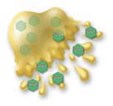Calydon receives three patents for tumor- killing viruses

"Stealth bombs" that replicate within and kill cancer cells
Calydon Inc. (Sunnyvale, CA) has received three U.S. patents that expand the company's proprietary position on engineering tumor-specific viruses that invade and kill prostate cancer cells.
Issued to Calydon were U.S. Patents:
- 6,051,417 – Prostate cancer drug screening using hKLK2 enhancer
- 6,136,792 – Prostate specific enhancer polynucleotides and methods of use thereof
These three issues add to Calydon's five other patents on adenovirus-based cancer therapeutics.

In terms of sheer numbers, Calydon's patent portfolio is modest by biotechnology company standards. However, each of their patents represents a significant novelty in cancer therapeutics or drug screening:
- U.S. Patents 5,698,443 and 5,871,726 cover methods for constructing a virus that incorporates the PSE gene for targeting and killing prostate cancer cells
- U.S. Patents 5,830,686 and 5,648,478 describe a human prostate tissue-specific enhancer gene and methods that use PSE for treating prostate disease
- U.S. Patent 5,783,435 claims methods for screening therapeutic prostate cancer agents
Calydon's goal is to develop cancer therapeutics with specificity for tumor cells that far exceeds that of standard cancer treatments such as chemotherapy or radiation. Calydon's approach, which uses a viral platform known as ARCA (attenuated replication competent adenovirus) is akin to "molecular surgery" involving no scalpel, radiation, or small-molecule cytotoxin.
Calydon's CV706 viral agent has undergone Phase I/II testing for early-stage prostate cancer, while CV787 is now in Phase I/II trials for metastatic disease. So far CV706 has passed safety and preliminary efficacy standards. Most important: It actually works in humans. Calydon is keen on pursuing its ARCA approach for cancers other than prostate.
ARCA in a nutshell
Unlike other "stealth" cancer therapeutics, ARCA uses adenovirus itself as the cell-killing agent. When the virus replicates within a cell, the cell lyses and is destroyed. As the cell bursts new virus particles move on to infect other cells. If the virus cannot replicate, it is harmless.

In its natural form, adenovirus cannot replicate in human cells unless certain replication triggers contained in the genetic code of the virus are switched on. Calydon takes care of the molecular switch by engineering a trigger into the adenovirus. Transcriptional response elements (TRSs)—genes found, for the most part, only in cancer cells—are the replication triggers.

Calydon's TREs triggers are set up so they are almost always turned on in the target cancer cells and almost always turned off in normal cells. The process of triggering, infection, replication, cell death, and viral release is repeated as long as cancer cells exist. When the malignant cells are gone, the viruses become harmless.
Advantages
Specificity. ARCA permits creation of cytolytic viruses that replicate in and kill the targeted cancer cells 10,000 times more frequently than normal cells. Compare this to chemotherapy, which only kills between two and six cancer cells for each healthy cell it destroys, and radiation, which kills every cell that's dividing rapidly.

Amplification. Because these viruses replicate, destroy, and then spread through the tumor to infect other cancer cells, fewer treatment cycles may be required than with traditional chemotherapy. Most of Calydon's preclinical and clinical experience suggests a single administration of virus may be enough to treat most cancers. Since the adenovirus is generally safe, however, repeat treatments are possible—not true for tumors that become resistant to chemo or radiation.
Broad applicability. Varying the human genes inserted into adenovirus can lead to the attack on a variety of different cancers. The drug process follows a repetitive pattern: once a tumor-specific biomarker has been identified, it is a matter of time before the related TREs are identified and an ARCA virus is created. Calydon believes its technology is applicable in cancers of the prostate, liver, bladder, and colon, among others.

Synergy. In preclinical studies, the ARCA viruses we have created for prostate and liver cancer have demonstrated a significant synergy with common chemotherapeutic agents such as Taxol, Taxotere, and doxorubicin, as well as with radiation therapy.
Ease of manufacturing. Adenovirus is well characterized and robust. Calydon's products can be manufactured using conventional fermentation and standard downstream processing, at low cost.
For more information: Calydon Inc., 1324 Chesapeake Terrace, Sunnyvale, CA 94089. Tel: 408-734-0733. Fax: 408-734-1714.
By Angelo DePalma
Managing Editor, Drug Discovery Online and Pharmaceutical Online
adepalma@vertical.net
